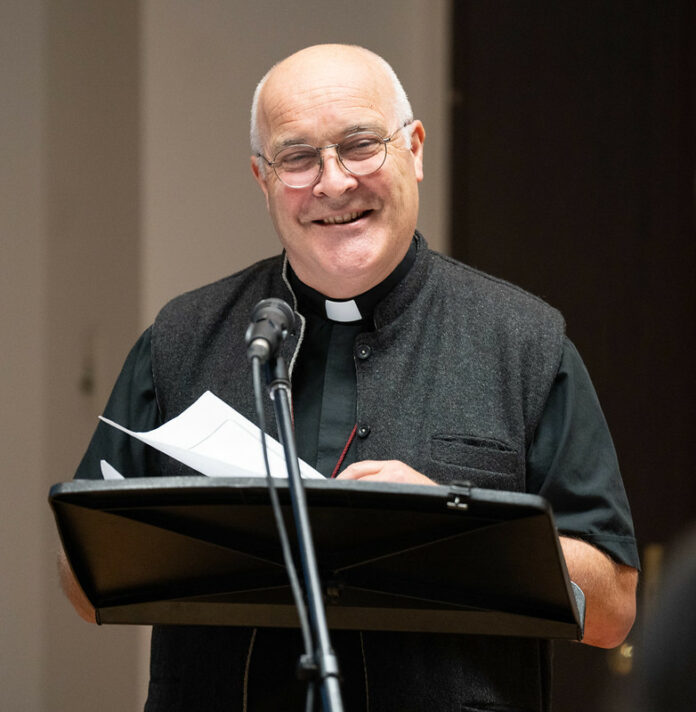Tomorrow night (Tuesday 17 December), BBC Radio’s File on Four will broadcast an edition focusing on the Church’s response to serial child abuser David Tudor – or the Revd David Tudor, to give him his full title. The programme, researched and presented by the BBC’s religion editor Aleem Maqbool, is already available to listen to now on the BBC Sounds app.
Amongst the people who don’t come out well in the programme is the Archbishop of York, Stephen Cottrell, who was Bishop of Chelmsford at a key point in Tudor’s timeline. The programme includes calls from various people for Cottrell to resign. I echo those calls. His “management” of safeguarding has been marked by inaction, complacency, fine words, and lies.
In response to news reports about tomorrow night’s broadcast, Stephen Cottrell has issued a statement. And, like most times he speaks about safeguarding, he can’t resist his natural impulse to lie.
Let’s look at what he says:
- “The situation I faced when I became Bishop of Chelmsford, was horrible and intolerable – most of all for the survivors and victims who had bravely come forward and shared their stories from the 1980s.”
If it was intolerable, why did Stephen Cottrell tolerate it? - “This morning’s news coverage incorrectly implies that no action was taken until 2024. That is not the case.”
The news coverage does not imply that no action was taken until 2024. The coverage – and the File on Four programme – presents a timeline of action, including various times when Tudor was suspended. The coverage does not say that no action was taken, it says – correctly – that the action that was taken was insufficient. - “In my capacity as Bishop of Chelmsford, I suspended David Tudor from office at the first opportunity, when a new victim came forward to the police in 2019. Up until 2019, there were no legal grounds to take alternative action.”
There were plenty of legal grounds to take alternate action.
For a start, the Archbishop could have removed from Tudor the office of Area Dean of Hadleigh. The position of Area Dean is the gift of the bishop and can be granted and removed at will. By retaining Tudor in that position, Stephen Cottrell was retaining the inherited position where Tudor was given additional responsibility and authority over other clergy.
It was also open to Stephen Cottrell not to install Tudor as an honorary canon of Chelmsford Cathedral in 2015. Tomorrow’s File on Four programme says that Cottrell’s office told them that “the new title for David Tudor wasn’t a promotion or personal reward but happened because of a change in policy, meaning Area Deans will automatically made honorary canons.”
Did this change in policy happen in a vacuum? Was Stephen Cottrell not consulted on it? Did nobody review who the area deans were to see who would be made a canon under the new policy?
FACT: Stephen Cottrell as bishop, and others in the diocese, approved this change knowing that it would result in Tudor being made an honorary canon.
Secondly, it might be argued that Tudor’s actions were driven by “an infirmity of mind”, in which case section 6 of the Incumbents (Vacation of Benefices) Measure 1977 comes into play, leading to an “enquiry” into whether Tudor was able “to discharge adequately the duties attaching to his benefice” and, if he wasn’t, “whether it is desirable that he should resign his benefice”.
As the local authority had written to schools warning them not to allow Tudor in, and as the dioceses required him not to be alone with young people, there’s a pretty big inability to “discharge adequately the duties attached to his benefice”.
And if that didn’t apply, where has Stephen Cottrell argued for a change in the law to give bishops power to act in such cases?
Thirdly, in 2012 that Tudor had made a £10,000 out of court settlement to “Jessica” (a pseudonym used by the File on Four programme). Cottrell told the programme that he had received legal advice to the effect that as the payment was made without an admission of liability, no action could be taken.
Wrong: it was perfectly in order for this to have been the impetus for a complaint under the Clergy Discipline Measure. As “Jessica” had initiated a civil claim against Tudor, it is highly likely that she would have provided a statement to an archdeacon to allow such a complaint to proceed.
Read it all in Churchabuse.uk



